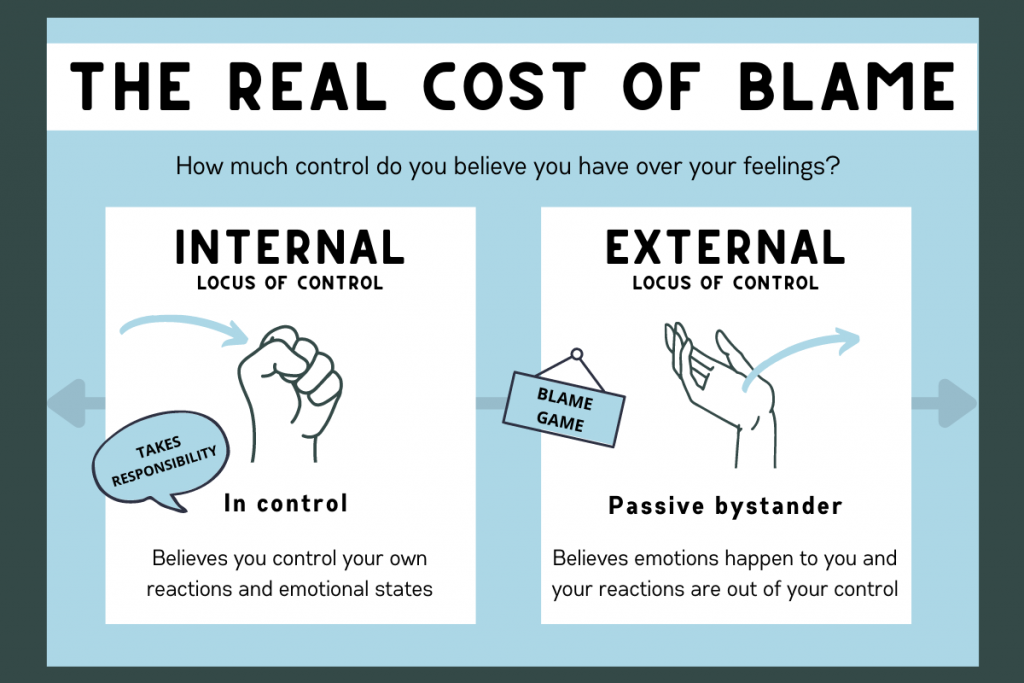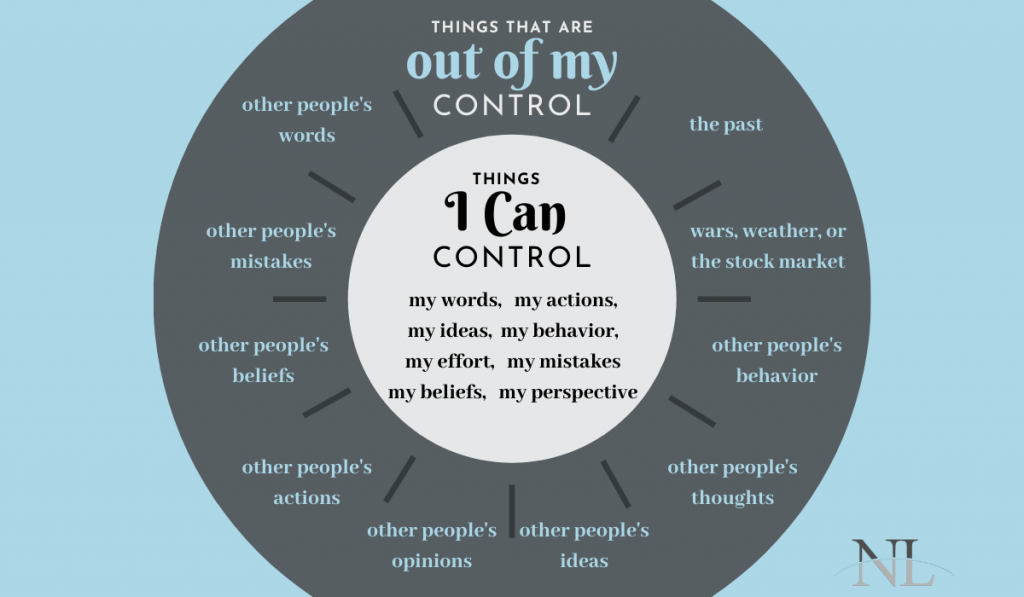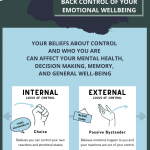The Real Cost of Blame
Your underlying beliefs about emotions and your control over your feelings can affect your mental health, moral decision making, memory, and general well-being. Believing you don’t have control can lead to blame and a victim mentality.

Throughout your life, events big and small have happened and they had an impact on you. These events impacted who you are now because your interpretation of these experiences has influenced your beliefs, sometimes unconsciously. For example, an event may impact your beliefs about anger and aggression, which is powerful because that unconscious belief shapes the way you behave when you feel angry. Your family, friends, past experiences, and culture all influence your current beliefs and behaviors. While you cannot change the past or it’s influence, you can choose to move forward in a different way. It is important to identify and find ways to alter your belief system so you can more effectively function in your life today. The good news is that you can alter your belief system to operate in a healthier manner; making these changes can give you back the control over your choices and your emotional wellbeing.
Trauma, betrayal, unhealthy family dynamics, and manipulation are all examples of events that can influence your beliefs about control and who you are. You may fall into a pattern of blame, negative self-talk, and avoidance whenever you feel helpless or experience emotional pain. Over time this pattern can contribute to angry outbursts, depression, isolation, and loneliness. (1)
Here are some basics about blaming to help you regain control over your emotional wellbeing:
Blame is the best way to stay in a problem.
Blame is attractive because it allows you to remain a victim to whatever it was that happened. This response can develop as a coping method but holding onto blame simply keeps you in that place of hurt and trauma. In reality, by blaming others you are effectively giving them your power. Holding onto unresolved conflict serves to sabotage your life and prevents you from taking real meaningful action.
There comes a time when you need to give up hurt and anger and stop feeling sorry for yourself. You can choose now to not blame others for your problems and feelings. Take control of your life by choosing to move forward.
The past cannot be changed.
It is important to remember that your past is gone. It is alive only in your memory. When you ruminate on the past, you are merely experiencing your memories of the situation, not the actual situation. Because you will only vividly remember those parts of the event that were emotionally significant to you, these memories may be incomplete or inaccurate. Studies show that emotionally charged memories can be the most vivid, but they are also subject to your unconscious beliefs and interpretations. One way to move toward emotional health is by using a strategy called “reappraisal” which involves reinterpreting an emotionally upsetting event in a more positive light.
Looking at your past differently can help you to see your true self and recognize your negative self-image to be an illusion. You can choose to stop looking at what was, and instead start to look at what is, or what you want the future to be. As you positively reprocess past events and recognize how they shaped your identity, you will find you are actually changing your beliefs about yourself.
When you blame others for the unhappiness in your life, you do not take responsibility for yourself.
Victim mentality is when you blame other people and circumstances for your own unhappiness. Remember how we said past events impact who you are because they influence your beliefs? Victim mentality is a result of those beliefs. You may feel life is unfair, or that someone else’s success or other events are preventing you from success or happiness. By blaming others for the circumstances of your life, you only depress yourself and decrease your motivation to reach your dreams. Victim thinking actually creates a pattern of behavior that reinforces the belief that you are a victim.
Does this sound familiar? You can create your own peace of mind starting right now. You can begin to take back control over your thinking and your behavior by not blaming others for your lack of success. Start taking full responsibility for where you currently are and where you are going in your life. Commit to taking responsibility for your thoughts, feelings, and behavior from this point forward. If you get stuck, you can use this circle of control graphic to keep yourself accountable.

The solution to blaming is in forgiveness.
Most people stuck in this victim mentality are afraid to forgive. Forgiveness is especially difficult when you suffered trauma and that person hasn’t asked for forgiveness. You may think that holding tightly to your hurt and anger will somehow protect you from future hurt. Perhaps you justify your decision to hold onto resentment because you think forgiveness makes what they did ok.
It is important to remember that forgiveness doesn’t erase trauma, it doesn’t make their actions ok, and it doesn’t make you vulnerable to future hurt. Forgiveness is not for the person that wronged you! Forgiveness is for you because hurt and anger held tightly keep you emotionally imprisoned with negative thoughts; thoughts that will leave you feeling tired, frustrated, depressed, bitter, lonely, and resentful.
If you are ready to move on from victimhood and blame, think about who you need to forgive. Perhaps you need to forgive a parent, a spouse, or yourself. Finally, remember that forgiveness is an ongoing process, not a one-time decision.
Above all remember that emotions and the subsequent reaction to your emotions are in your control. When you learn to recognize your thought patterns and underlying beliefs, you can choose to change these beliefs and take back control of your emotional wellbeing.
If you find yourself struggling with a past trauma, this idea of forgiveness, or you need help moving away from the victim pattern of thinking, we are here for you. Contact us today to schedule a session.
Resources:
Looking for more information about this topic? Check out How Emotions Are Made by Lisa Feldman Barrett and watch her TED talk here.
If you are struggling with perfectionism- which is an issue of trying to control too much, check out these great free resources we created to help you evaluate your thinking patterns, beliefs, and emotions.
Sources:
(1) https://www.healthline.com/health/victim-mentality#signs
https://greatergood.berkeley.edu/article/item/what_you_think_about_your_emotions_matters

